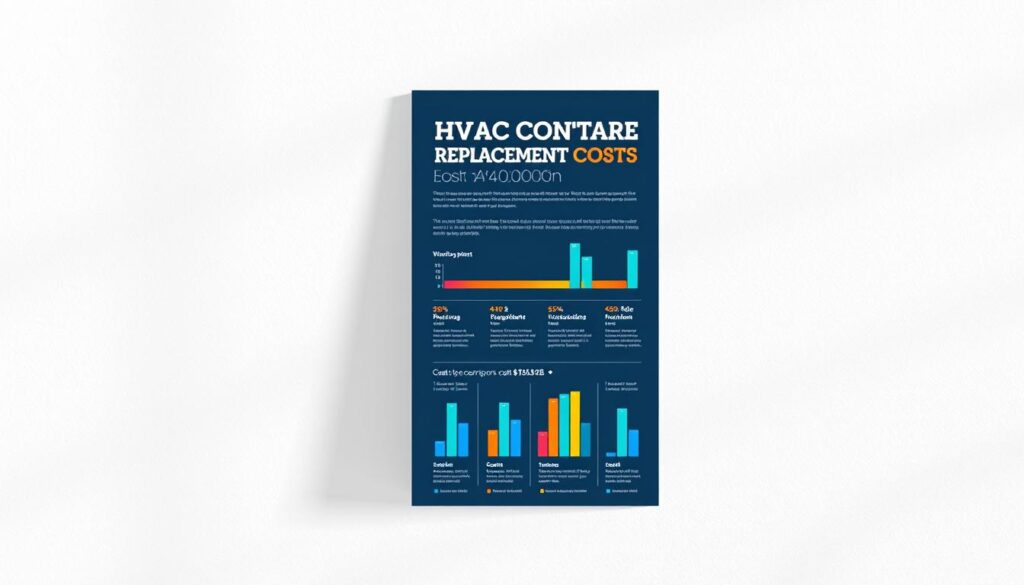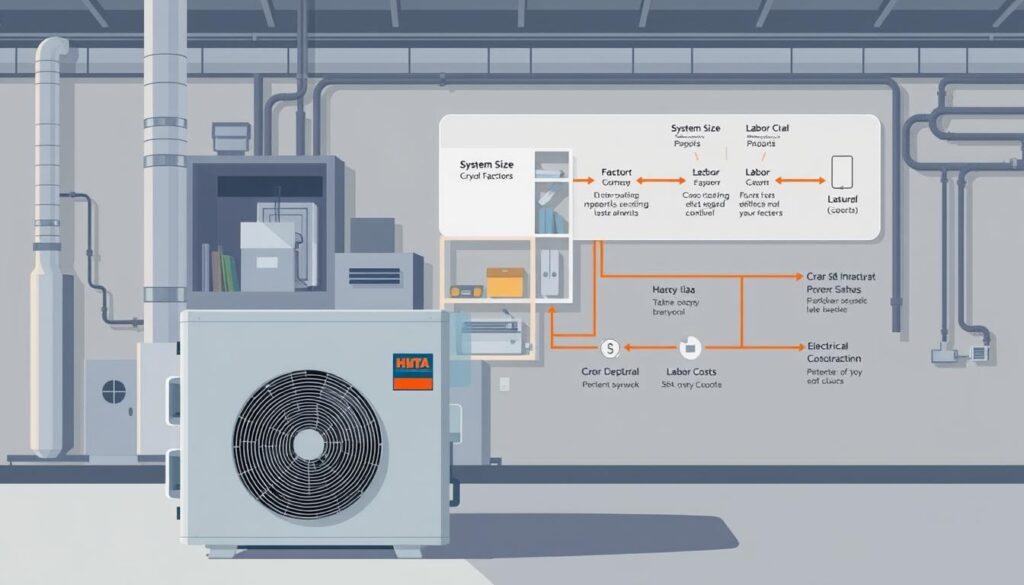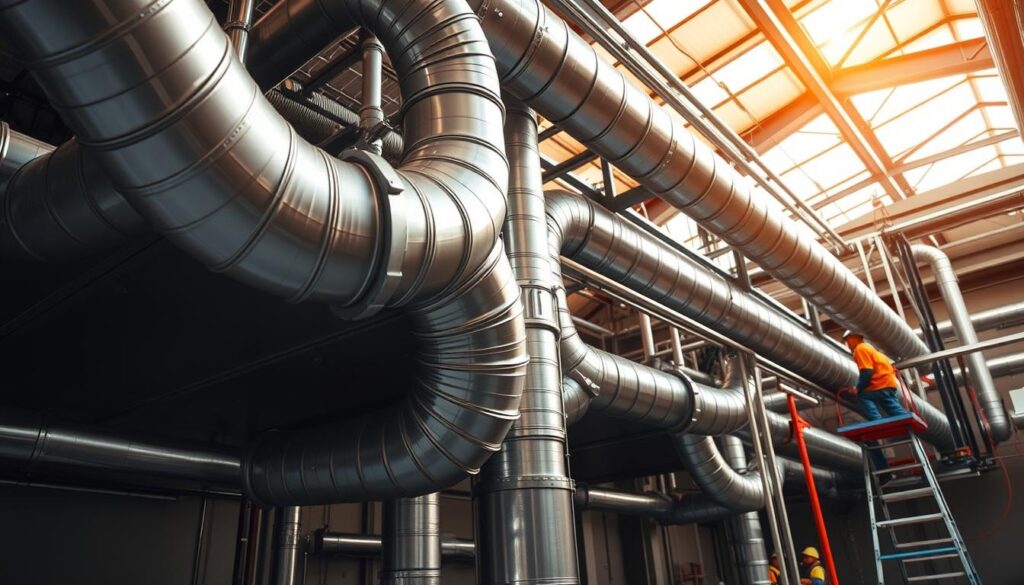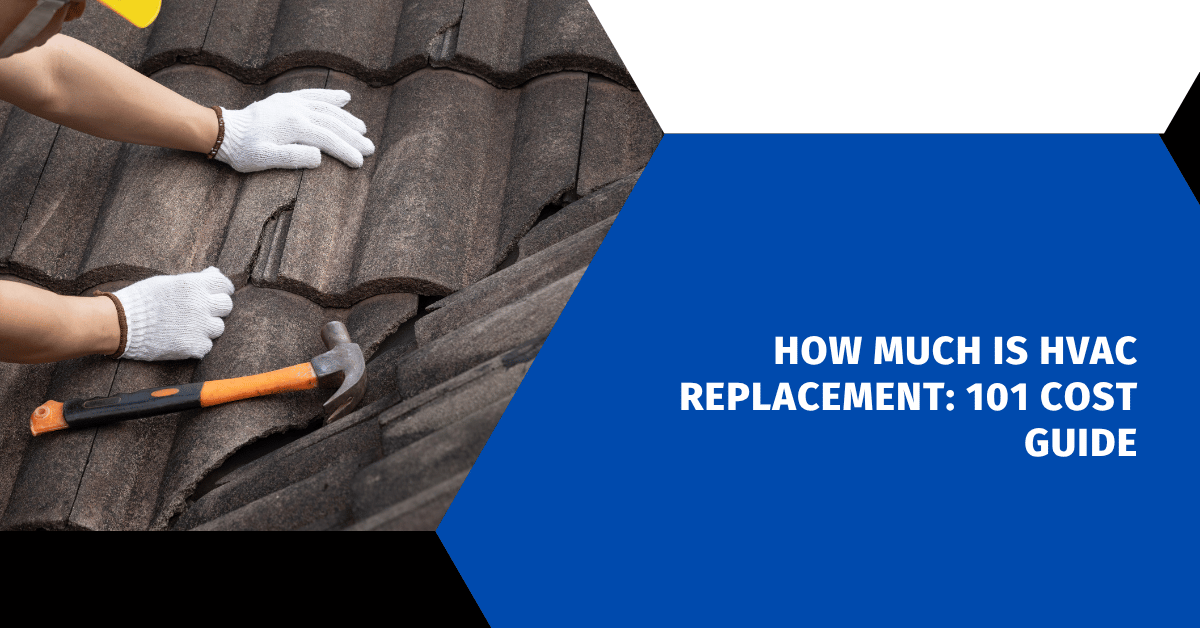Affiliate Disclosure
HVAC Guide Guys is a participant in the Amazon Services LLC Associates Program, an affiliate advertising program designed to provide a means for sites to earn advertising fees by advertising and linking to Amazon.
How Much Is HVAC Replacement? Are you curious about the cost of an HVAC unit this year? Replacing your home’s heating and cooling system can seem daunting. But, understanding the cost doesn’t have to be hard.

For a standard system change in 2025, homeowners might spend between $5,000 and $11,000. This big project needs careful planning and budgeting.
Your HVAC system keeps your home comfortable by controlling temperature and air quality. Knowing the costs can help you decide if it’s time to upgrade or maintain your system.
Key Takeaways
- Average HVAC replacement costs range from $5,000 to $11,000
- Costs vary based on system type and home size
- Investing in efficient systems can reduce long-term energy expenses
- Professional assessment is key for accurate pricing
- Many financing options are available for HVAC upgrades
Table of Contents
Understanding HVAC System Basics
When you think about getting a new AC or installing a whole HVAC system, it’s key to know the basics. HVAC systems do more than just control the temperature. They are vital for your home’s comfort and air quality.
Today’s HVAC systems are designed to manage temperature, humidity, and air flow. They keep your home comfortable all year round.
What is an HVAC System?
An HVAC system is a complete solution for your home’s indoor environment. It uses advanced technology to:
- Regulate indoor temperature
- Control humidity levels
- Filter and circulate air
- Improve overall indoor air quality
Average Lifespan of HVAC Systems
Knowing how long your HVAC system lasts helps you plan for replacements and budget for new installations.
| System Type | Average Lifespan | Replacement Considerations |
|---|---|---|
| Central Air Conditioner | 10-15 years | Efficiency decline, repair frequency |
| Furnace | 15-20 years | Performance reduction, energy consumption |
| Heat Pump | 10-15 years | Seasonal performance, maintenance history |
Components of a Complete HVAC System
A full HVAC system has key parts that work together for your comfort:
- Heating unit (furnace or heat pump)
- Cooling unit (air conditioner)
- Ductwork for air distribution
- Thermostat for temperature control
- Air filtration system
“Investing in understanding your HVAC system can save you thousands in unnecessary ac replacement prices.” – HVAC Professional
Knowing these basic parts helps you make smart choices for your home’s heating and cooling.
Explore Our HVAC Shop
Looking for top-rated HVAC tools, parts, and accessories? Visit our shop and find the perfect solution for your needs.
Visit the ShopAverage HVAC Replacement Costs in 2025
Planning to replace your HVAC system is a big deal for homeowners. In 2025, expect to pay between $5,000 and $11,000 for a full system swap. More complex setups might cost up to $16,000.
Several key factors influence your total cost. An HVAC replacement calculator can give you a closer estimate. Costs vary based on:
- Home square footage
- System complexity
- Regional pricing differences
- Energy efficiency ratings
Knowing the costs of HVAC replacement helps you plan your budget. Here are some average price ranges for different systems:
| System Type | Average Cost Range | Complexity |
|---|---|---|
| Basic Split System | $5,000 – $7,500 | Low |
| High-Efficiency System | $8,000 – $11,000 | Medium |
| Complex Installation | $12,000 – $16,000 | High |
Using an online hvac replacement calculator can give you a more precise estimate. It takes into account local labor rates, equipment efficiency, and ductwork changes.
Pro tip: Always get multiple quotes and compare professional estimates to ensure you’re getting the best value for your HVAC equipment replacement.
How Much Is HVAC Replacement by System Type
When you’re looking to replace your HVAC, knowing the costs of different systems is key. Each system has its own price and performance. This can greatly affect how much you’ll spend.
Choosing the right HVAC depends on several things. These include your home’s size, the local weather, and how energy-efficient you want it. Commercial systems are often more complex and pricier.
Central Air Conditioning Systems
Central air systems usually cost between $1,900 and $5,500. Important things to think about are:
- How big your home is
- The energy efficiency rating
- How hard it is to install
Furnace Systems
Furnace replacements can range from $1,600 to $10,000. This depends on the fuel type and how efficient it is. You can choose from:
- Gas furnaces
- Electric furnaces
- Oil furnaces
Heat Pump Systems
Heat pumps are great for both heating and cooling. They cost between $1,300 and $40,000. Costs vary based on capacity, technology, and installation needs.
“Investing in the right HVAC system can save you thousands in energy costs over time.” – HVAC Industry Expert
Explore Our HVAC Shop
Looking for top-rated HVAC tools, parts, and accessories? Visit our shop and find the perfect solution for your needs.
Visit the ShopFactors Impacting HVAC Installation Costs

Planning an affordable HVAC replacement? Knowing what affects costs is key. Your investment depends on several important factors. These factors influence both the initial cost and long-term energy savings.
Home size is a big factor in HVAC system needs. Bigger homes need stronger systems, which raises costs. Contractors will check your home’s size to suggest the right system.
- Home square footage
- Existing ductwork condition
- System complexity
- Local labor rates
- Equipment brand and efficiency ratings
The state of your ductwork also matters a lot. Old or damaged ductwork might need to be replaced, increasing costs. Upgrading ductwork can improve system performance and energy use.
“Investing in the right HVAC system can save you money in the long run through improved energy efficiency and reduced maintenance costs.”
Labor costs vary by location and installation complexity. Urban areas often have higher labor rates than rural areas. Professional installation ensures your system meets local codes and manufacturer specs.
Choosing your new system involves weighing upfront costs against long-term savings. Energy-efficient systems might cost more upfront but save on utility bills over time.
HVAC Equipment and Brand Selection
Choosing the right HVAC equipment is key to managing costs and ensuring comfort. The brand and system you pick can affect both the initial cost and energy efficiency over time.
Homeowners should look at several factors when picking HVAC units. These factors impact the cost and how well the system works.
Top HVAC Manufacturers
There are many trusted brands in the market:
- Carrier: Known for innovative technology
- Trane: Recognized for durability and performance
- Rheem: Offers excellent mid-range systems
- Lennox: Specializes in high-efficiency units
Comparing SEER Ratings
SEER (Seasonal Energy Efficiency Ratio) ratings are important for efficiency. Higher ratings mean less energy use and lower costs over time.
| SEER Rating | Energy Efficiency | Cost Impact |
|---|---|---|
| 13-14 | Standard Efficiency | Lower Upfront Cost |
| 15-16 | Good Efficiency | Moderate Savings |
| 17-20 | High Efficiency | Significant Energy Savings |
Warranty Considerations
Warranty coverage is important when buying a new HVAC system. Standard warranties usually last from 5-10 years. Premium brands offer longer protection.
It’s important to check the warranty details. Look at what’s covered, including parts and labor. Also, make sure you understand any registration requirements to get the most from your investment.
Explore Our HVAC Shop
Looking for top-rated HVAC tools, parts, and accessories? Visit our shop and find the perfect solution for your needs.
Visit the ShopDuctwork Costs and Considerations

When you’re planning to replace your home’s HVAC system, don’t forget about the ductwork. It’s a key part that affects your overall cost. Your hvac replacement calculator should include the cost of ductwork. This usually ranges from $15 to $20 per linear foot for new installations.
Good ductwork design is essential for your HVAC system’s efficiency. Many people forget about this important step. But, the right ductwork can:
- Improve system performance
- Lower energy use
- Better indoor air quality
- Stop air leaks
The state of your current ductwork affects replacement costs. Older homes might need a full duct system replacement. This can increase your budget by thousands. Several things influence ductwork replacement costs, including:
- How old your ductwork is
- The condition of the materials
- Your home’s size
- How easy it is to access the ducts
Pro tip: Think about ductless mini-split systems for older homes or areas with limited ductwork. They offer flexible heating and cooling and might be easier to install.
Investing in quality ductwork is as important as choosing the right HVAC equipment for long-term comfort and energy savings.
Additional Components and Upgrades
When you’re looking to replace your HVAC, think about adding more to make it better. These upgrades can make your home more comfortable and improve the air quality. They go beyond just replacing the HVAC equipment.
Smart Thermostats: Intelligent Climate Control
Smart thermostats are a big step up for your HVAC. They cost between $120 and $260. These devices let you control your home’s temperature from anywhere and save energy.
- Learn your temperature preferences automatically
- Reduce energy waste through intelligent programming
- Provide detailed energy usage reports
- Integrate with smart home ecosystems
Air Purification Systems: Breathing Cleaner Air
It’s important to improve your home’s air quality when you replace your HVAC. Air purification systems cost from $100 to thousands. They help remove pollutants and allergens from the air you breathe.
- HEPA filtration technology
- UV light sterilization
- Remove microscopic particles and pathogens
- Reduce respiratory irritants
Zoning Systems: Customized Comfort
Zoning systems let you control the temperature in different parts of your home. This means you can make each area just right for you. It also helps save energy.
- Individual room temperature settings
- Reduce energy consumption
- Eliminate hot and cold spots
- Enhance overall home comfort
Adding these components can turn your HVAC replacement into a full home comfort upgrade.
HVAC Financing Options
When you need to replace your HVAC system, knowing your financing options is key. Homeowners have many ways to make the cost more manageable. This helps spread out the expense of the replacement.
Your main financing choices are:
- Home Equity Loans: Use your home’s value to get lower interest rates
- Personal Loans: Good for those with strong credit scores
- HVAC Company Installment Plans: Zero-interest short-term financing might be available
- Home Equity Lines of Credit (HELOCs): Revolving credit with tax benefits
Your credit score affects your financing terms. A score over 700 usually gets you better rates. Some HVAC makers work with banks to offer special financing deals. This can make your replacement more affordable.
“Exploring multiple financing options can save you thousands over the life of your HVAC system.” – HVAC Financial Experts
Before picking a financing option, think about these important points:
- Interest rates
- Loan terms
- Monthly payments
- Possible prepayment penalties
Pro tip: Some utility companies and local governments offer rebates or low-interest loans for energy-efficient HVAC replacements. This can lower your overall cost.
Explore Our HVAC Shop
Looking for top-rated HVAC tools, parts, and accessories? Visit our shop and find the perfect solution for your needs.
Visit the ShopCost-Saving Strategies for HVAC Replacement
Lowering ac replacement costs doesn’t mean you have to give up quality. Smart homeowners can find ways to save money without losing comfort. This is done by using smart strategies for affordable hvac replacement.
When you replace your HVAC, timing is everything. Replacing it during off-peak seasons can save you a lot of money. Contractors usually charge less during spring and fall when there’s less demand.
- Get multiple quotes from reputable HVAC contractors
- Research energy efficiency incentives
- Consider long-term energy savings
- Check for utility company rebates
Being energy-efficient can cut down your expenses a lot. High-efficiency systems cost more upfront but save you money in the long run. They use less energy.
“Investing in an efficient HVAC system is like putting money back in your pocket every month.” – HVAC Industry Expert
Tax credits and utility rebates can help with the initial cost of replacing your AC. Federal and state programs offer financial help for installing energy-efficient systems. This makes affordable hvac replacement easier for those on a budget.
Don’t forget the importance of regular maintenance. Keeping your HVAC in good shape can make it last longer. It also prevents the need for expensive emergency repairs.
Conclusion
Figuring out how much an HVAC replacement costs can seem daunting. But, with the right info, you can choose wisely. It’s all about weighing immediate costs against long-term benefits like efficiency and comfort. Your home’s needs will dictate the replacement process, and an HVAC calculator can give you a rough idea of costs.
The $5,000 rule is a useful guide for deciding between fixing or replacing your system. If your system’s age times repair costs is over $5,000, a new system might save you money. HVAC pros can look at your situation and suggest the best option for you.
When choosing a new HVAC, think about energy efficiency, system type, and installation quality. New systems are much better at saving energy and cutting down on bills. By carefully looking at your choices and talking to experts, you can get a cozy home that’s also good for your wallet.
Remember, HVAC replacement is about more than just money. It’s about making your home a comfortable and efficient place to live. Take your time to research, compare, and get expert opinions to find the best fit for your home.

